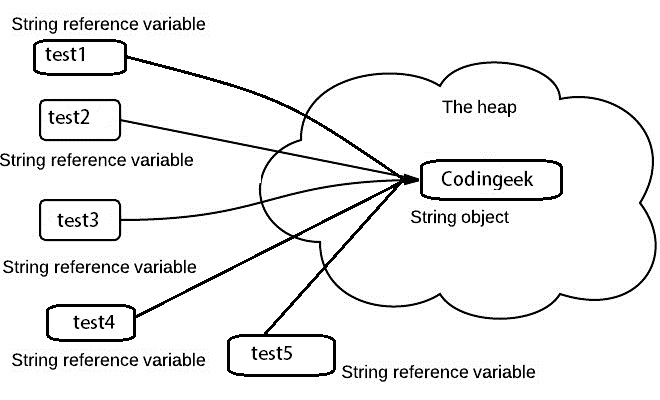Why Are Strings Immutable in Java? Insights right into Memory Efficiency
Why Are Strings Immutable in Java? Insights right into Memory Efficiency
Blog Article
Checking Out the Benefits of Immutable Strings in Modern Shows Paradigms
In the world of modern shows standards, the principle of immutable strings stands as a cornerstone of robust software application development. By embracing immutable strings, designers can ensure boosted information honesty, enhanced thread safety and security, streamlined debugging procedures, boosted safety measures, and reliable efficiency optimization.
Boosted Data Honesty

By avoiding the adjustment of string items, immutability eliminates the risk of unintended modifications to the data they hold. This not only enhances the protection of the details yet likewise boosts the dependability of the code that relies on these strings.
Immutability additionally sustains safer multithreading environments, as simultaneous access to immutable strings does not position the risk of data corruption via simultaneous alterations. This property streamlines the process of dealing with strings in identical programming circumstances.
Fundamentally, immutability acts as a protective shield around the information stored within strings, improving their integrity by making sure that once defined, their values continue to be unmodified throughout the program's implementation.

Improved String Safety And Security
Unalterable strings boost the thread safety and security of programs by making sure that when a string things is produced, its value can not be customized. This building gets rid of the threat of concurrent threads attempting to modify the exact same string simultaneously, which might cause information corruption or inconsistent states in the program - Why are strings immutable in Java?. In a multi-threaded environment, where multiple threads accessibility and control data all at once, the immutability of strings supplies a degree of safety and security by ensuring that the information stays unchanged throughout its lifecycle
Streamlined Debugging Procedures
Given the enhanced string safety promoted by unalterable strings, a considerable benefit occurs in the world of streamlined debugging processes. Immutable strings, once developed, can not be modified, making it less complicated to trace the circulation of information and identify the resource of insects in a program. This immutability guarantees that strings stay regular throughout the implementation of the program, minimizing the likelihood of unforeseen changes that might bring about errors.
When debugging with mutable strings, developers typically run into concerns where a string's value is modified webpage inadvertently, making it challenging to identify the origin cause of an insect. Nevertheless, with immutable strings, the data stays the same, enabling designers to concentrate on analyzing the actual reasoning of the code as opposed to finding where and when a string was customized inaccurately.
In addition, unalterable strings streamline the debugging process by allowing simpler recreation of insects. Given that unalterable strings do not alter state, developers can recreate and examine pests better, bring about quicker identification and resolution of issues within the codebase. This streamlined debugging operations ultimately contributes to greater software application top quality and boosted general development efficiency.

Raised Security Procedures
Enhancing information protection and fortifying system integrity, the use of immutable strings in software applications adds considerably to boosted security procedures. Immutable strings additionally play a crucial function in stopping typical protection vulnerabilities such as barrier overflows and SQL injection strikes, as attempts to manipulate string data at runtime are inherently limited.
Additionally, useful reference the immutability of strings improves the predictability of program habits, making it simpler to confirm inputs and stop unexpected changes that can compromise safety and security. This predictability streamlines the process of bookkeeping and verifying code, making it possible for designers to identify potential security loopholes more successfully. Generally, incorporating immutable strings into software application development practices not just enhances the robustness and dependability of applications yet additionally strengthens their durability against safety threats.
Efficient Efficiency Optimization
When dealing with mutable strings, procedures like concatenation or substring production commonly result in the creation of new string things, leading to memory overhead and boosted processing time. By permitting strings to remain stable Website and continuous, immutable strings help with better memory management and caching opportunities, eventually improving the total performance of the software program.
Because unalterable strings can not be customized as soon as created, they can be shared across strings without the risk of unexpected modifications, lowering the need for synchronization mechanisms and enhancing concurrency. Unalterable strings streamline debugging procedures as programmers can rely on that a string's value will continue to be regular throughout the program's execution, eliminating potential errors caused by mutable state changes.
Final Thought
In final thought, the advantages of using immutable strings in modern programming paradigms can not be overemphasized. Boosted information integrity, enhanced thread safety and security, simplified debugging processes, raised protection actions, and reliable performance optimization all add to the general effectiveness of programs jobs. By incorporating immutable strings right into programming techniques, designers can benefit from a more durable and trusted codebase.
Immutability, a vital function of strings in programming languages such as Java and Python, guarantees that as soon as a string things is produced, it can not be changed or modified.Unalterable strings enhance the string security of programs by guaranteeing that once a string object is developed, its value can not be changed. Immutable strings also play an essential duty in preventing typical security vulnerabilities such as buffer overflows and SQL shot strikes, as efforts to manipulate string information at runtime are naturally restricted.
By permitting strings to remain constant and stable, immutable strings facilitate far better memory management and caching chances, inevitably improving the total performance of the software application.
Unalterable strings streamline debugging procedures as designers can rely on that a string's value will certainly stay regular throughout the program's execution, removing prospective errors caused by mutable state changes.
Report this page